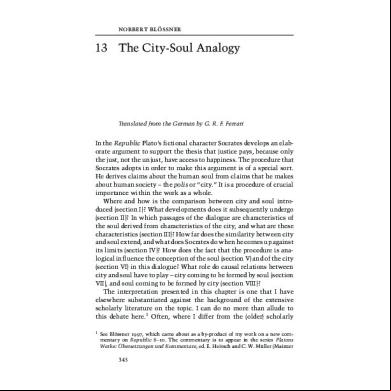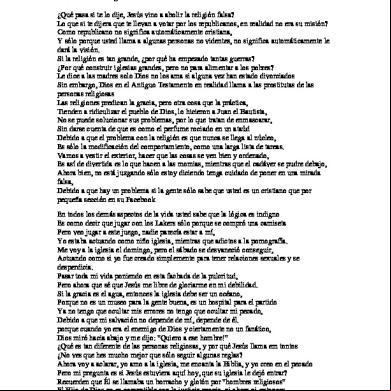The Horse Analogy 4c6y3j
This document was ed by and they confirmed that they have the permission to share it. If you are author or own the copyright of this book, please report to us by using this report form. Report 3b7i
Overview 3e4r5l
& View The Horse Analogy as PDF for free.
More details w3441
- Words: 312
- Pages: 1
Breanna Ross Dr. Westmoreland Philosophy Section 062C 12 September 2011 Criticism to Horse Analogy
“The Horse analogy”, an excerpt from Plato’s Apology is a defense or justification of Socrates’s view on Meletus’s attack on him as an “atheist”. While teaching the youth Meletus believes that Socrates exemplifies a negative contributor to their minds. This meaning that his teachings consist of there being no Gods which goes against the teachings of the government and/or state. In confronting Meletus, Socrates argues that like horses, men are treated well by a few good men and treated harshly by others which are common characteristics of life. Whereas, in Meletus conviction all men elevate one another and that Socrates is the only corruptor. Socrates stated “Happy indeed would be the condition of youth if they had one corrupter only, and the rest of the world their improvers”. The statement shows good and bad factors to life. The one good being, that this view paints a positive picture of man. Whereas the bad being a negative view of the gods who bicker, betray and kill. Furthermore, this belief that Meletus s leaves no room for the gods and which Socrates denotes. If the Gods are being more flawed than man than why serve them? Aren’t they supposed to be greater, wiser, and omnipotent to man? Meletus attack on Socrates only makes his conviction a failure and Socrates the wiser. In the horse analogy Meletus’s claim was not ed by real life events. In one way Meletus is punishing Socrates for his alleged teachings rather than “elevating” him which goes against what Meletus ratifies. Also, the ideal life he envisions is Utopia and no other because if such times exist what would be the need of the court, for every man “improves” one another rather than destroys them. Meletus claim again brings into question the Gods who are blemished.
“The Horse analogy”, an excerpt from Plato’s Apology is a defense or justification of Socrates’s view on Meletus’s attack on him as an “atheist”. While teaching the youth Meletus believes that Socrates exemplifies a negative contributor to their minds. This meaning that his teachings consist of there being no Gods which goes against the teachings of the government and/or state. In confronting Meletus, Socrates argues that like horses, men are treated well by a few good men and treated harshly by others which are common characteristics of life. Whereas, in Meletus conviction all men elevate one another and that Socrates is the only corruptor. Socrates stated “Happy indeed would be the condition of youth if they had one corrupter only, and the rest of the world their improvers”. The statement shows good and bad factors to life. The one good being, that this view paints a positive picture of man. Whereas the bad being a negative view of the gods who bicker, betray and kill. Furthermore, this belief that Meletus s leaves no room for the gods and which Socrates denotes. If the Gods are being more flawed than man than why serve them? Aren’t they supposed to be greater, wiser, and omnipotent to man? Meletus attack on Socrates only makes his conviction a failure and Socrates the wiser. In the horse analogy Meletus’s claim was not ed by real life events. In one way Meletus is punishing Socrates for his alleged teachings rather than “elevating” him which goes against what Meletus ratifies. Also, the ideal life he envisions is Utopia and no other because if such times exist what would be the need of the court, for every man “improves” one another rather than destroys them. Meletus claim again brings into question the Gods who are blemished.










